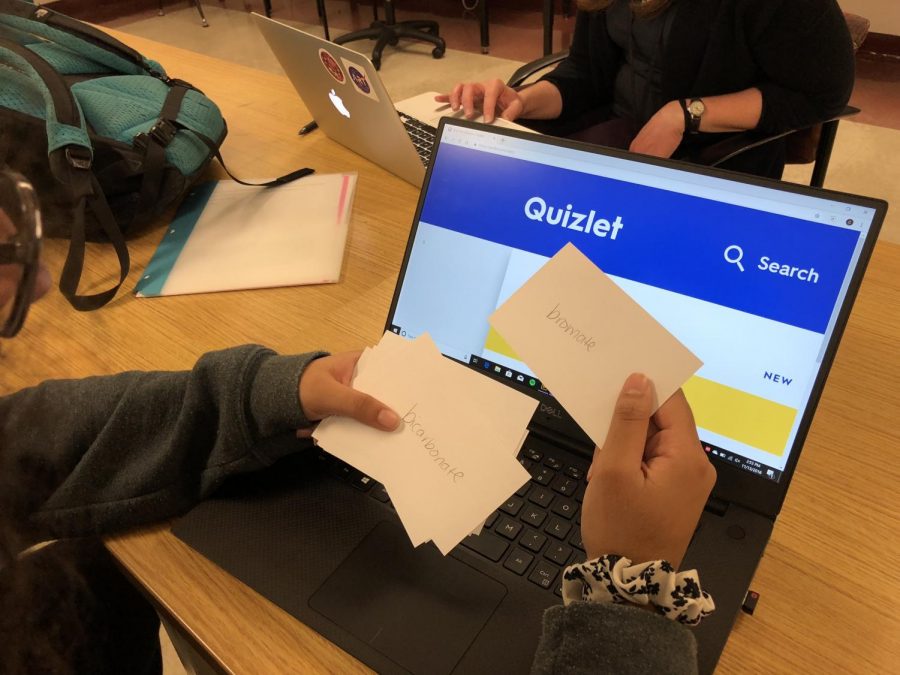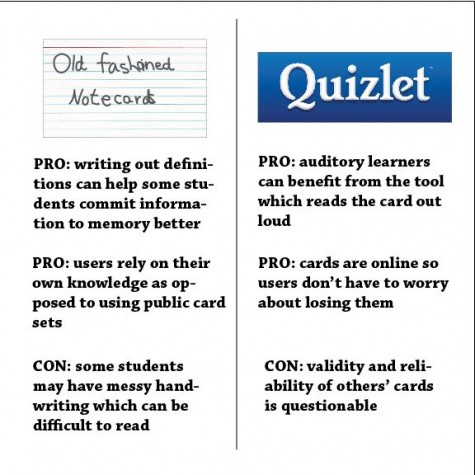The reality of virtual studying: Quizlet versus traditional notecards
Students use a variety of study methods. Some prefer traditional note cards like these, while others use technology, like Quizlet.
March 30, 2016
Students and teachers may be benefiting from the convenience of online flashcard apps like Quizlet, but some say this new technology has cons.
Special Education Liaison Felicia Rutigliano believes that both Quizlet, a site where students can create or use previously generated flashcard sets, and traditional methods such as paper flashcards and note taking are beneficial to any student.
“I see a lot of values in Quizlet, but there will always be those students who work better with a paper and pen,” Rutigliano said. “It really depends on the learner,”
Although some students seem to work better with old fashioned approaches, Rutigliano recognizes Quizlet as a tool to help understand basic concepts.
“I see value in memorizing terms; I think Quizlet is a start for understanding and remembering,” Rutigliano said. “I do think that Quizlet is a great tool though, especially since you can have it play back to you so you are using your auditory learning sense, and that is very helpful to some students too.”
Instructional Technology teacher Julie Doyle agrees that Quizlet has its benefits.
“You create them, and then you don’t ever lose them because they are always online and[you can]access them from anywhere,” Doyle said. “You can share them with other people and you can look at ones that other people have created to help you.”
Although sharing information with peers seems like a pro, it can come with consequences.
“You have to be what’s called a good curator of information. You have to test Quizlet’s validity and credibility,” Doyle said. ‘I think it is worth checking out the validity of them[the flashcards]”
Sophomore Chloe Sainsbury believes that Quizlet is not always the most accurate source regarding facts because any person has the ability to make public sets.
“A con to Quizlet is that it’s unreliable because you can’t trust others’ answers,” Sainsbury said. “You one hundred percent can’t trust that they’re right. You have to rely on your own [answers],”
Rutigliano thinks that Quizlet can be less interactive and have less of a connection to the brain than physically writing your own flashcards.
“Sometimes when we write something and we are seeing it at the same time, that forms a memory. You can actually say ‘Oh, I remember writing that’,” Rutigliano said.
“I do think hands down that there is a connection between seeing, physically writing it, and memorizing as opposed to typing,” Rutigliano said. “There is a connection between the tactile pieces of it, handwriting, and remembering.”
Doyle agrees, but is unsure of the legitimacy of this theory.
“They [educators] do say, for some people, that the physical action of taking notes helps you to remember it better,” Doyle said. “I haven’t heard of enough studies to prove that that happens all the time.”
Sophomore Claire Duffy praises Quizlet, and always prefers it over flashcards.
“Quizlet is great for me because I can’t even read my own handwriting,” Duffy said.
Overall, both classic flashcard and Quizlet methods are effective ways for students to study and retain information. Although some students prefer one over the other, it is the learning style of the student that makes the difference.













Manasvi Jadcharla • Jul 8, 2018 at 5:52 pm
Also, a con for using Quizlet is that you can’t guarantee you will fully learn all the information since the vocabulary is written out beforehand. On the other hand, flashcards have to be written out by the learner him/herself, so the material will be easier to learn.
Dan Welty • Jan 25, 2018 at 7:49 am
Quizlet is definitely a benefit to learning. As with flashcards there is a little known strategy to this in that it is better to do, say 5 flashcards in a row, and THEN review the answers. Studies have found this more beneficial than doing one flashcard and seeing the answer, then the next and seeing the answer, etc. Also, another thing students do is that when they “master” a flashcard, they take it out of the deck. Studies show that you should leave it in the deck and it helps mastery of all the concepts.
A lot of this work falls under the concept of retrieval practice. You can learn more about it here:
https://www.retrievalpractice.org
It is something my students practice about 2-3 times per unit and they are conveniently on CANVAS for future use (to prep for the midterm).
As for validity, I create Quizlets for each unit and embed them in CANVAS so they are reliable and easily accessed by students.